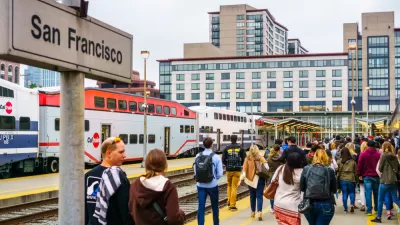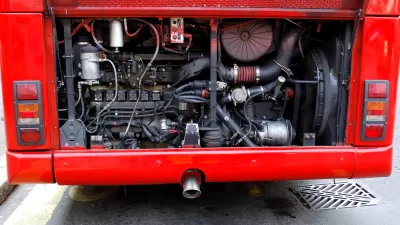Urban Engines uses real-time transit data, and raffles, to encourage transit riders to commute during non-peak hours.
Urban Engines, a startup run by Shiva Shivakumar and Balaji Prabhakar, is using 'crowd-sensing' real-time transit data and financial incentives to draw transit commuters away from peak hour traffic.
According to Eric Jaffe, Urban Engines' use of real-time data allows them to "produce interactive data visualizations that give short-term congestion insights (this platform is overcrowded, trains on this line are bunching) and longer-term traffic trends (on rainy days this station needs more cars). Transit operators can use that information to scheduled and dispatch train supply more efficiently."
Urban Engines' model of financially incentivizing off-peak commutes has already proven successful in three cities (Bangalore, Singapore, and Palo Alto). Per Jaffe, during a six month pilot study in Bangalore, "[roughly] 14,000 locals were given the chance to commute outside peak hours; every time they did, they improved their odds of winning a weekly raffle that paid out prizes ranging from $10 to $240. Over the course of the pilot, commuter traveling pre-rush hour doubled, and the average morning commute time of all bus riders fell from 71 to 54 minutes."
As Jaffe points out, Urban Engines' model has not been applied to drivers nor does it address "the generally entrenched nature of commute habits." And, while Urban Engines' real-time model helps identify system needs, it does not deal with systemic issues within transit agencies such as "limited equipment and personnel" to respond to such needs.
FULL STORY: Using Insights and Incentives to End Rush Hour

Alabama: Trump Terminates Settlements for Black Communities Harmed By Raw Sewage
Trump deemed the landmark civil rights agreement “illegal DEI and environmental justice policy.”

Study: Maui’s Plan to Convert Vacation Rentals to Long-Term Housing Could Cause Nearly $1 Billion Economic Loss
The plan would reduce visitor accommodation by 25% resulting in 1,900 jobs lost.

Planetizen Federal Action Tracker
A weekly monitor of how Trump’s orders and actions are impacting planners and planning in America.

Waymo Gets Permission to Map SF’s Market Street
If allowed to operate on the traffic-restricted street, Waymo’s autonomous taxis would have a leg up over ride-hailing competitors — and counter the city’s efforts to grow bike and pedestrian on the thoroughfare.

Parklet Symposium Highlights the Success of Shared Spaces
Parklets got a boost during the Covid-19 pandemic, when the concept was translated to outdoor dining programs that offered restaurants a lifeline during the shutdown.

Federal Homelessness Agency Places Entire Staff on Leave
The U.S. Interagency Council on Homelessness is the only federal agency dedicated to preventing and ending homelessness.
Urban Design for Planners 1: Software Tools
This six-course series explores essential urban design concepts using open source software and equips planners with the tools they need to participate fully in the urban design process.
Planning for Universal Design
Learn the tools for implementing Universal Design in planning regulations.
Caltrans
Smith Gee Studio
Institute for Housing and Urban Development Studies (IHS)
City of Grandview
Harvard GSD Executive Education
Toledo-Lucas County Plan Commissions
Salt Lake City
NYU Wagner Graduate School of Public Service




























